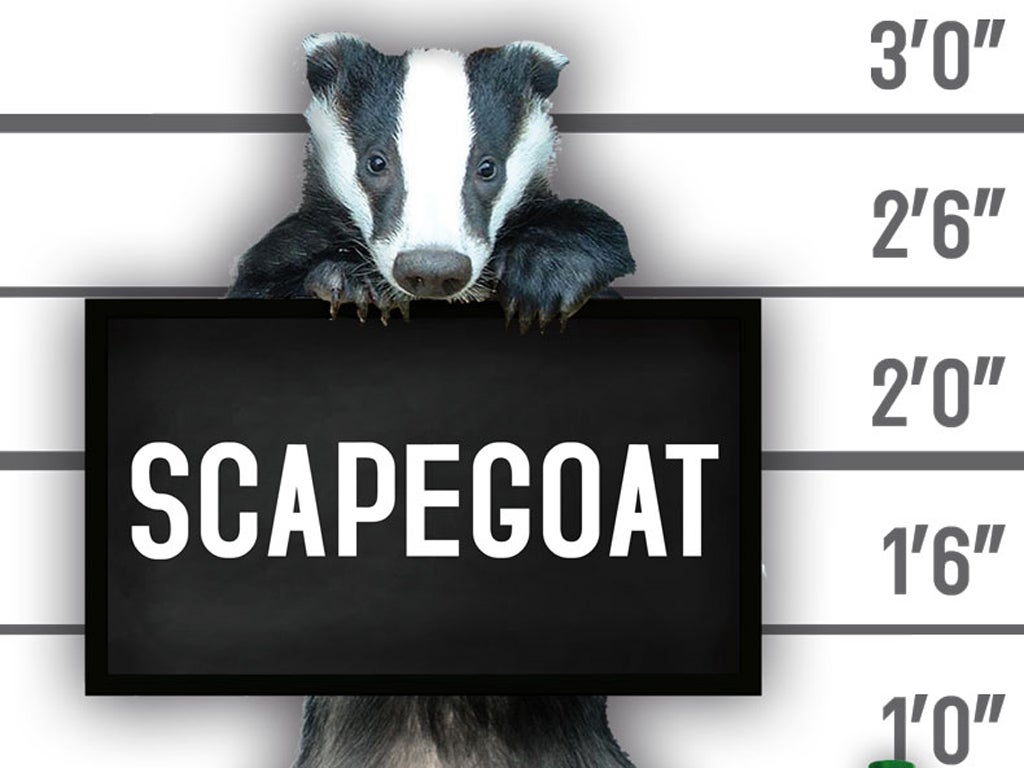Why are the supermarkets keeping so schtum about the badger cull?
The truth is that the badger is being used as a scapegoat by both the dairy industry and the Government that's using flawed science as a justification for the cull

Your support helps us to tell the story
From reproductive rights to climate change to Big Tech, The Independent is on the ground when the story is developing. Whether it's investigating the financials of Elon Musk's pro-Trump PAC or producing our latest documentary, 'The A Word', which shines a light on the American women fighting for reproductive rights, we know how important it is to parse out the facts from the messaging.
At such a critical moment in US history, we need reporters on the ground. Your donation allows us to keep sending journalists to speak to both sides of the story.
The Independent is trusted by Americans across the entire political spectrum. And unlike many other quality news outlets, we choose not to lock Americans out of our reporting and analysis with paywalls. We believe quality journalism should be available to everyone, paid for by those who can afford it.
Your support makes all the difference.As the howls of protest against the badger cull grow ever louder, there's one voice that's strikingly silent in the vociferous debate over the shooting of badgers: that of our big supermarkets.
The big supermarkets enjoy a dominant position in the retail milk market with 70 per cent of milk being bought from the Big Seven: ASDA; Co-op; M&S; Morrisons; Sainsbury's; Tesco and Waitrose.
Unusually for a sector that normally can't keep its big marketing mouth shut, the Big Seven are keeping tight-lipped on the issue and what little they've said amounts to nothing more than sitting on the farmyard fence.
Care For The Wild, Ethical Consumer and other groups from Team Badger, a coalition of animal welfare and environmental groups opposed to the badger cull, believe that the big supermarkets must shoulder some of the blame for the crisis facing the dairy industry.
For years dairy farmers have had to deal with the supermarkets' bully-boy tactics of slashing the amount they paid for the farmers' milk.
This downward pressure on prices has led to the dairy industry industrialising milk production on an unprecedented scale in an effort to turn a profit from ever tighter margins with Daisy being turned into a non-stop milk-making machine.
The impact on animal welfare is that cow herds are increasingly stressed making them more vulnerable to infections, including bovine TB.
With falling incomes dairy farmers have also increased the trade in cattle to over 13 million cattle movements a year, the highest figure in the EU, despite such movements being recognised as a major cause of disease transmission.
The Big Seven are also open to accusations of hypocrisy over the badger cull crisis.
Many progressive supermarkets take a responsible attitude on other wildlife issues such as the negative impact that palm oil plantations are having on orangutans in south east Asia.
So why don't they care about the senseless killing of badgers, a protected species in the UK?
Just three of the Big Seven supermarkets - ASDA, M&S and Waitrose - guarantee that their own-brand milk is sourced from outside the cull zones, although this is probably down to the luck of their supply-chains rather than policy.
If the cull is rolled out nationally it's doubtful that even these supermarkets would be able to claim that their milk is badger-friendly and like the other big supermarkets they'll have to face an increasingly angry army of shoppers demanding action.
The truth is that the badger is being used as a scapegoat by both the dairy industry which is in crisis and the Government that's using flawed science as a justification for the cull. It's no surprise that the supermarkets aren't challenging this as it maintains the status quo and keeps milk prices low.
Public opinion is clearly on the side of the badgers yet the cull has been steamrollered through regardless illustrating that democracy is failing our wildlife.
With the public being ignored, it seems that the only hope for the badgers are those people who are trying to stop the senseless killing of badgers themselves.
If you don't want to buy into the cull then check out Ethical Consumer's badger-friendly shopping list that helps shoppers boycott milk sourced from dairy farmers involved in the badger cull. It also includes a guide to dairy alternatives which avoids the animal welfare problems that the dairy industry poses for both cows and badgers.
Shoppers can also badger the Big Seven into helping to stop the cull, whilst the supermarkets themselves should wake up, accept that they're part of the problem and use their colossal economic clout to become part of the solution.
Katy Brown is an animal rights, environmental and social justice campaigner and co-edits Ethical Consumer magazine
Join our commenting forum
Join thought-provoking conversations, follow other Independent readers and see their replies
Comments